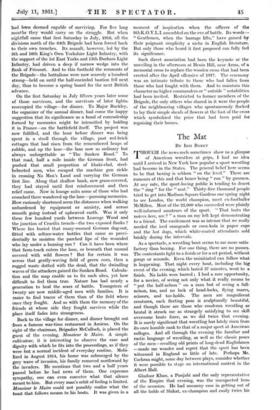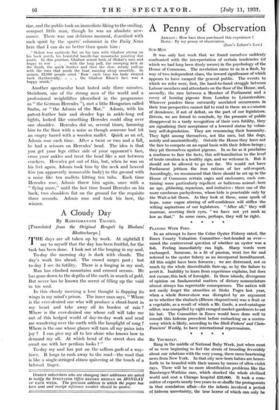The Mat
BY IRIS BARRY
THOUGH the news-reels sometimes show us a glimpse of American wrestlers at grips, I had no idea until I arrived in New York how popular a sport wrestling had become in the States. The general belief here seems to be that boxing is seldom "on the level." There are rumours of this and that boxer being " run " by gunmen. At any rate, the sport-loving public is tending to desert the " ring " for the "mat." Thirty-five thousand people tried to get into Madison Square Gardens one spring night to see Londos, the world champion, meet ex-footballer McMillen. Most of the 22,000 who succeeded were plainly well-informed amateurs of the sport. "That hoits the noives here, see ? " a man on my left kept demonstrating to a friend. The excitement was so intense that we really needed the iced orangeade or coca-kola in paper cups and the hot dogs, which white-coated attendants sold briskly during the intervals.
As a spectacle, a wrestling bout seems to me more satis. factory than boxing. For one thing, there are no pauses. The contestants fight to a finish or for a set period, without gongs or seconds. Even the uninitiated can follow what is happening. That night every bout, including the big event of the evening, which lasted 57 minutes, went to a finish. No holds were barred ; I had a rare opportunity, for a novice, of seeing not only what it really means to "put the half-nelson" on a man but of seeing a full- nelson, too, and no lack of head-locks, flying mares, scissors, and toe-holds. The men are magnificent creatures, each fleeting pose is sculpturally beautiful, and though there are those who condemn wrestling as brutal it struck me as strangely satisfying to see skill overcome brute force, as we did twice that evening. It is surely significant that wrestling has lately risen from its once humble rank to that of a major sport at American colleges. And all through the evening the familiar and rustic language of wrestling, as well as the classic poses of the men—recalling old prints of long-dead Englishmen —made me wonder and regret that the sport has been witnessed in England so little of late. Perhaps Mr. Cochran might, some day between plays, consider whether it were possible to stage an international contest in the Albert Hall.
Ghafoor Khan, a Punjabi and the only representative of the Empire that evening, was the unexpected hero of the occasion. He had uncanny ease in getting out of all the holds of Shikat. ex-champion and easily twice his size, and the public took an immediate liking to the smiling, compact little man, though he was an absolute new- comer. There was one delirious moment, &scribed with such spirit by the sports' columnist in the Daily News here that I can do no better than quote him :
." Shikat was suddenly flat on his turn with Ghafoor sitting on Ins back porch, his beautiful handle-bar moustache pointing dub south. In this position, Ghisfoor seized both of Shikat's toes and began to row . . . with the long pull, the sweeping kick at We 'finish, the quick feather and then the slow, steady pull-up with the toes that' serwls the boat running along smoothly. In unison, 22,000 people cried ' Row ' each time his body swayed back rhythmically. . . On Ghafoor Khan's face was a happy smirk."
Another spectacular bout lasted only three minutes. Steinborn, one of the strong men of the world and a. 'profetsional weightlifter (described in the programme as "the German Hercules "), met a lithe Hungarian called Szabo, or "the Adonis of the Mat." Adonis, with his patent-leather hair and slender legs in ankle-long red tights, looked like something Hercules could sling over one shoulder. Hercules did so, several times, lamming him to the floor with a noise as though someone had hit an empty barrel with a wooden mallet. Quick as an eel, Adonis rose each time. After a twist or two and a fall, he had a scissors on Hercules' head. The idea is that you get your legs either side of your opponent's face, cross your ankles and treat the head like a nut between crackers. Hercules got out of this, but, when he was on his feet again, Adonis took him by the neck and heaved hint (an apparently immovable body) to the ground with a noise like ten mallets hitting ten tubs. Each time Hercules rose, Adonis threw him again, once with a "flying mare," until the last time found Hercules on his back, two shoulders flat on the ground for the requisite three seconds. Adonis rose and took his bow, the winner.



































 Previous page
Previous page